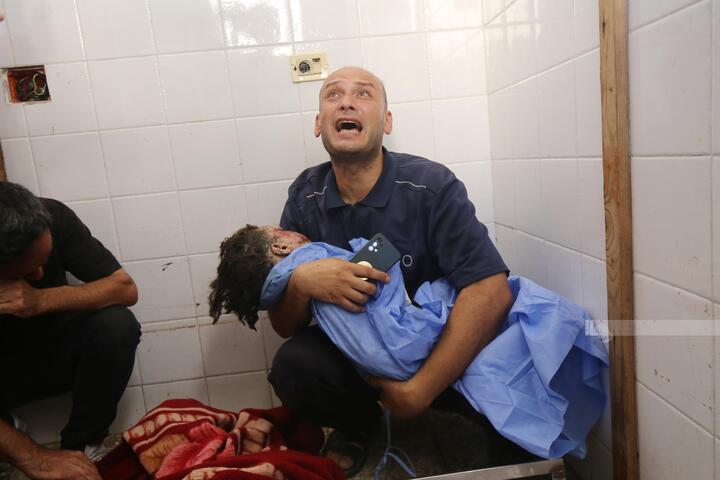Thousands of babies have been born into the war under non-stop Israeli attacks and a catastrophic humanitarian situation.
Qatar’s Minister of State for International Cooperation, Lolwah Al Khater, has called out global double standards over Israel’s ongoing killings of Palestinian babies in the Gaza Strip, as the war nears its 10-month mark.
In a post on X on Monday, Al Khater shared a harrowing video of parents in the Gaza Strip carrying the body of their decapitated baby, whose head was blown off by an Israeli airstrike.
In the video, a bereaved woman, who appears to be the baby’s mother, was heard yelling: “I was just giving him water!”
Commenting on the disturbing footage, Al Khater said: “Speaking of beheaded babies, but of course we know not all babies are born equal.” The vocal Qatari diplomat added the hashtags #GazaGenocide and #Stop_Gaza_Genocide in the same post.
The harrowing video showed a glimpse of the daily scenes that Palestinians in the Gaza Strip have been witnessing and living for nearly 10 consecutive months in what has been widely described as a genocide.
Since October 7, 2023, Israel has killed at least 39,363 people, including more than 16,000 children, and wounded 90,923 others under the brutal onslaught in the Strip.
The Israeli war also displaced at least 1.9 million people out of the Gaza Strip’s population of 2.1 million – down from the United Nations’ initial estimate of 2.3 million, following the deaths and exodus of people fleeing for safety.
Thousands of babies have been born into the war under non-stop Israeli attacks and a catastrophic humanitarian situation.
According to figures by the UN in February, around 5,500 women give birth every month, with more than 155,000 pregnant and breastfeeding women at a high risk of malnutrition.
UNICEF also estimates that one million children are in need of mental health and psycho-social support, with at least 17,000 children currently being unaccompanied or separated.
On Monday, Gaza’s Health Ministry declared a polio epidemic in the besieged enclave, “years after the eradication of polio in Palestine”, citing the catastrophic situation on the ground caused by Israel’s genocidal war.
Deprivation of clean water, destruction of sanitation infrastructure, accumulation of garbage and food insecurity caused by the war led to the outbreak of the epidemic.
Children are also the main victims of malnutrition under the complete siege and absence of basic resources. According to Palestine’s news agency, Wafa, 39 people died as a result of starvation and dehydration as of Monday, with the latest victim being six-year-old child Ali Anas Al-Tatar.
Childbirth has also become a traumatic experience for women in the Gaza Strip under harsh conditions, with no access to medicine or doctors, forcing them to deliver their babies in fragile tents.
On July 9, the Palestinian Family Planning and Protection Association said miscarriages in the Gaza Strip have risen to at least 300 percent since last October.
Almost 70 children have also been getting injured in Gaza every day since the beginning of the war according to figures shared by the UN’s children agency (UNICEF) on April 16.
More than 10 children per day have lost one or both of their legs in Gaza since the beginning of the war, Save the Children said on January 7.
Medics in Gaza carried out the majority of the amputations without anaesthetic or proper medical tools due to the extreme shortage of equipment under Israel’s complete blockade.
Israeli occupation forces had invaded and destroyed the vital Egypt-Gaza Rafah Crossing on May 6, causing the humanitarian situation to exacerbate.
Qatar and Jordan have joined efforts in delivering life-saving aid on Thursday through the Jordanian border. The shipment included 55 tonnes of tents and health supplies provided by the Qatar Fund for Development.
Speaking to Qatar’s news agency at the time from Amman, Al Khater called on the Israeli occupation forces to provide aid and basic necessities to Palestinians in Gaza. Al Khater also became the first high-ranking Arab official to enter Gaza when she visited Rafah last November.
“What is now required from the Israeli occupation forces is not only to allow the entry of aid,but rather, according to international law, to provide aid and basic life necessities,” Al Khater said on July 25.
“We are witnessing a significant deterioration in the humanitarian situation in the Gaza Strip for several reasons, including the expansion of the Israeli occupation forces’ operations[…]not to mention the siege that already was and is still imposed on the Strip,” she added.







